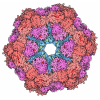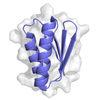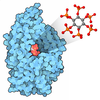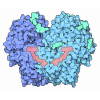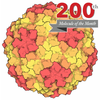[English] 日本語
 Yorodumi
Yorodumi- PDB-8ua4: Structure of eastern equine encephalitis virus VLP in complex wit... -
+ Open data
Open data
- Basic information
Basic information
| Entry | Database: PDB / ID: 8ua4 | |||||||||||||||||||||||||||||||||||||||||||||||||||||||||||||||
|---|---|---|---|---|---|---|---|---|---|---|---|---|---|---|---|---|---|---|---|---|---|---|---|---|---|---|---|---|---|---|---|---|---|---|---|---|---|---|---|---|---|---|---|---|---|---|---|---|---|---|---|---|---|---|---|---|---|---|---|---|---|---|---|---|
| Title | Structure of eastern equine encephalitis virus VLP in complex with VLDLR LA1 | |||||||||||||||||||||||||||||||||||||||||||||||||||||||||||||||
 Components Components |
| |||||||||||||||||||||||||||||||||||||||||||||||||||||||||||||||
 Keywords Keywords | VIRUS LIKE PARTICLE / Alphaviruses / Receptor | |||||||||||||||||||||||||||||||||||||||||||||||||||||||||||||||
| Function / homology |  Function and homology information Function and homology informationreelin receptor activity / glycoprotein transport / VLDL clearance / very-low-density lipoprotein particle receptor activity / ventral spinal cord development / Reelin signalling pathway / very-low-density lipoprotein particle binding / low-density lipoprotein particle receptor activity / very-low-density lipoprotein particle clearance / togavirin ...reelin receptor activity / glycoprotein transport / VLDL clearance / very-low-density lipoprotein particle receptor activity / ventral spinal cord development / Reelin signalling pathway / very-low-density lipoprotein particle binding / low-density lipoprotein particle receptor activity / very-low-density lipoprotein particle clearance / togavirin / reelin-mediated signaling pathway / very-low-density lipoprotein particle / cargo receptor activity / positive regulation of dendrite development / T=4 icosahedral viral capsid / lipid transport / dendrite morphogenesis / regulation of synapse assembly / apolipoprotein binding / cholesterol metabolic process / VLDLR internalisation and degradation / clathrin-coated pit / receptor-mediated endocytosis / memory / calcium-dependent protein binding / nervous system development / symbiont-mediated suppression of host toll-like receptor signaling pathway / host cell cytoplasm / receptor complex / symbiont-mediated suppression of host gene expression / lysosomal membrane / serine-type endopeptidase activity / fusion of virus membrane with host endosome membrane / calcium ion binding / symbiont entry into host cell / virion attachment to host cell / host cell nucleus / host cell plasma membrane / glutamatergic synapse / virion membrane / structural molecule activity / signal transduction / proteolysis / RNA binding / membrane / plasma membrane Similarity search - Function | |||||||||||||||||||||||||||||||||||||||||||||||||||||||||||||||
| Biological species |   Eastern equine encephalitis virus Eastern equine encephalitis virus Homo sapiens (human) Homo sapiens (human) | |||||||||||||||||||||||||||||||||||||||||||||||||||||||||||||||
| Method | ELECTRON MICROSCOPY / single particle reconstruction / cryo EM / Resolution: 3.58 Å | |||||||||||||||||||||||||||||||||||||||||||||||||||||||||||||||
 Authors Authors | Abraham, J. / Yang, P. / Li, W. / Fan, X. / Pan, J. | |||||||||||||||||||||||||||||||||||||||||||||||||||||||||||||||
| Funding support |  United States, 1items United States, 1items
| |||||||||||||||||||||||||||||||||||||||||||||||||||||||||||||||
 Citation Citation |  Journal: Nat Commun / Year: 2024 Journal: Nat Commun / Year: 2024Title: Structural basis for VLDLR recognition by eastern equine encephalitis virus. Authors: Pan Yang / Wanyu Li / Xiaoyi Fan / Junhua Pan / Colin J Mann / Haley Varnum / Lars E Clark / Sarah A Clark / Adrian Coscia / Himanish Basu / Katherine Nabel Smith / Vesna Brusic / Jonathan Abraham /   Abstract: Eastern equine encephalitis virus (EEEV) is the most virulent alphavirus that infects humans, and many survivors develop neurological sequelae, including paralysis and intellectual disability. ...Eastern equine encephalitis virus (EEEV) is the most virulent alphavirus that infects humans, and many survivors develop neurological sequelae, including paralysis and intellectual disability. Alphavirus spike proteins comprise trimers of heterodimers of glycoproteins E2 and E1 that mediate binding to cellular receptors and fusion of virus and host cell membranes during entry. We recently identified very-low density lipoprotein receptor (VLDLR) and apolipoprotein E receptor 2 (ApoER2) as cellular receptors for EEEV and a distantly related alphavirus, Semliki Forest virus (SFV). Here, we use single-particle cryo-electron microscopy (cryo-EM) to determine structures of the EEEV and SFV spike glycoproteins bound to the VLDLR ligand-binding domain and found that EEEV and SFV interact with the same cellular receptor through divergent binding modes. Our studies suggest that the ability of LDLR-related proteins to interact with viral spike proteins through very small footprints with flexible binding modes results in a low evolutionary barrier to the acquisition of LDLR-related proteins as cellular receptors for diverse sets of viruses. | |||||||||||||||||||||||||||||||||||||||||||||||||||||||||||||||
| History |
|
- Structure visualization
Structure visualization
| Structure viewer | Molecule:  Molmil Molmil Jmol/JSmol Jmol/JSmol |
|---|
- Downloads & links
Downloads & links
- Download
Download
| PDBx/mmCIF format |  8ua4.cif.gz 8ua4.cif.gz | 828.8 KB | Display |  PDBx/mmCIF format PDBx/mmCIF format |
|---|---|---|---|---|
| PDB format |  pdb8ua4.ent.gz pdb8ua4.ent.gz | 671.7 KB | Display |  PDB format PDB format |
| PDBx/mmJSON format |  8ua4.json.gz 8ua4.json.gz | Tree view |  PDBx/mmJSON format PDBx/mmJSON format | |
| Others |  Other downloads Other downloads |
-Validation report
| Summary document |  8ua4_validation.pdf.gz 8ua4_validation.pdf.gz | 1.7 MB | Display |  wwPDB validaton report wwPDB validaton report |
|---|---|---|---|---|
| Full document |  8ua4_full_validation.pdf.gz 8ua4_full_validation.pdf.gz | 1.7 MB | Display | |
| Data in XML |  8ua4_validation.xml.gz 8ua4_validation.xml.gz | 107 KB | Display | |
| Data in CIF |  8ua4_validation.cif.gz 8ua4_validation.cif.gz | 175.1 KB | Display | |
| Arichive directory |  https://data.pdbj.org/pub/pdb/validation_reports/ua/8ua4 https://data.pdbj.org/pub/pdb/validation_reports/ua/8ua4 ftp://data.pdbj.org/pub/pdb/validation_reports/ua/8ua4 ftp://data.pdbj.org/pub/pdb/validation_reports/ua/8ua4 | HTTPS FTP |
-Related structure data
| Related structure data |  42050MC 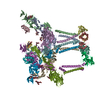 8ua8C 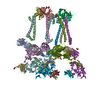 8ua9C M: map data used to model this data C: citing same article ( |
|---|---|
| Similar structure data | Similarity search - Function & homology  F&H Search F&H Search |
- Links
Links
- Assembly
Assembly
| Deposited unit | 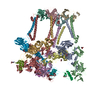
|
|---|---|
| 1 |
|
- Components
Components
-Envelope glycoprotein ... , 3 types, 12 molecules ADGJBEHKMNOP
| #1: Protein | Mass: 47984.246 Da / Num. of mol.: 4 Source method: isolated from a genetically manipulated source Details: Eastern equine encephalitis virus strain PE6 mature envelope glycoprotein E1 Source: (gene. exp.)   Eastern equine encephalitis virus / Strain: PE6 / Gene: E1 / Cell line (production host): 293T / Production host: Eastern equine encephalitis virus / Strain: PE6 / Gene: E1 / Cell line (production host): 293T / Production host:  Homo sapiens (human) / References: UniProt: Q88678 Homo sapiens (human) / References: UniProt: Q88678#2: Protein | Mass: 47047.020 Da / Num. of mol.: 4 Source method: isolated from a genetically manipulated source Details: Eastern equine encephalitis virus strain PE6 mature envelope glycoprotein E2 Source: (gene. exp.)   Eastern equine encephalitis virus / Strain: PE6 / Gene: E2 / Cell line (production host): 293T / Production host: Eastern equine encephalitis virus / Strain: PE6 / Gene: E2 / Cell line (production host): 293T / Production host:  Homo sapiens (human) / References: UniProt: Q88678, togavirin Homo sapiens (human) / References: UniProt: Q88678, togavirin#4: Protein | Mass: 7219.331 Da / Num. of mol.: 4 Source method: isolated from a genetically manipulated source Source: (gene. exp.)   Eastern equine encephalitis virus / Strain: PE6 / Cell line (production host): 293T / Production host: Eastern equine encephalitis virus / Strain: PE6 / Cell line (production host): 293T / Production host:  Homo sapiens (human) / References: UniProt: P08768 Homo sapiens (human) / References: UniProt: P08768 |
|---|
-Protein / Protein/peptide / Sugars / Non-polymers , 4 types, 18 molecules CFILR



| #3: Protein | Mass: 29178.846 Da / Num. of mol.: 4 / Mutation: K67N Source method: isolated from a genetically manipulated source Details: Eastern equine encephalitis virus mature capsid protein K67N mutant Source: (gene. exp.)   Eastern equine encephalitis virus / Strain: PE6 / Cell line (production host): 293T / Production host: Eastern equine encephalitis virus / Strain: PE6 / Cell line (production host): 293T / Production host:  Homo sapiens (human) / References: UniProt: Q88678 Homo sapiens (human) / References: UniProt: Q88678#5: Protein/peptide | | Mass: 4015.421 Da / Num. of mol.: 1 Source method: isolated from a genetically manipulated source Details: human very low-density lipoprotein receptor (VLDLR) LA1 Source: (gene. exp.)  Homo sapiens (human) / Gene: VLDLR / Cell line (production host): 293T / Production host: Homo sapiens (human) / Gene: VLDLR / Cell line (production host): 293T / Production host:  Homo sapiens (human) / References: UniProt: P98155 Homo sapiens (human) / References: UniProt: P98155#6: Sugar | ChemComp-NAG / #7: Chemical | ChemComp-CA / | |
|---|
-Details
| Has ligand of interest | Y |
|---|---|
| Has protein modification | Y |
-Experimental details
-Experiment
| Experiment | Method: ELECTRON MICROSCOPY |
|---|---|
| EM experiment | Aggregation state: PARTICLE / 3D reconstruction method: single particle reconstruction |
- Sample preparation
Sample preparation
| Component |
| |||||||||||||||||||||||||||||||||||||||||||||||||
|---|---|---|---|---|---|---|---|---|---|---|---|---|---|---|---|---|---|---|---|---|---|---|---|---|---|---|---|---|---|---|---|---|---|---|---|---|---|---|---|---|---|---|---|---|---|---|---|---|---|---|
| Molecular weight |
| |||||||||||||||||||||||||||||||||||||||||||||||||
| Source (natural) |
| |||||||||||||||||||||||||||||||||||||||||||||||||
| Source (recombinant) |
| |||||||||||||||||||||||||||||||||||||||||||||||||
| Details of virus | Empty: NO / Enveloped: YES / Isolate: STRAIN / Type: VIRUS-LIKE PARTICLE | |||||||||||||||||||||||||||||||||||||||||||||||||
| Natural host |
| |||||||||||||||||||||||||||||||||||||||||||||||||
| Buffer solution | pH: 7.2 | |||||||||||||||||||||||||||||||||||||||||||||||||
| Specimen | Embedding applied: NO / Shadowing applied: NO / Staining applied: NO / Vitrification applied: YES | |||||||||||||||||||||||||||||||||||||||||||||||||
| Vitrification | Cryogen name: ETHANE |
- Electron microscopy imaging
Electron microscopy imaging
| Experimental equipment |  Model: Titan Krios / Image courtesy: FEI Company |
|---|---|
| Microscopy | Model: FEI TITAN KRIOS |
| Electron gun | Electron source:  FIELD EMISSION GUN / Accelerating voltage: 300 kV / Illumination mode: FLOOD BEAM FIELD EMISSION GUN / Accelerating voltage: 300 kV / Illumination mode: FLOOD BEAM |
| Electron lens | Mode: BRIGHT FIELD / Nominal defocus max: 2000 nm / Nominal defocus min: 800 nm |
| Image recording | Electron dose: 53 e/Å2 / Film or detector model: GATAN K3 (6k x 4k) |
- Processing
Processing
| EM software | Name: PHENIX / Category: model refinement | ||||||||||||||||||||||||
|---|---|---|---|---|---|---|---|---|---|---|---|---|---|---|---|---|---|---|---|---|---|---|---|---|---|
| CTF correction | Type: NONE | ||||||||||||||||||||||||
| 3D reconstruction | Resolution: 3.58 Å / Resolution method: FSC 0.143 CUT-OFF / Num. of particles: 185420 / Symmetry type: POINT | ||||||||||||||||||||||||
| Refine LS restraints |
|
 Movie
Movie Controller
Controller





 PDBj
PDBj
